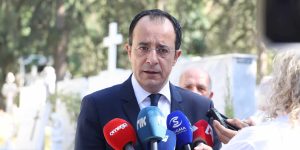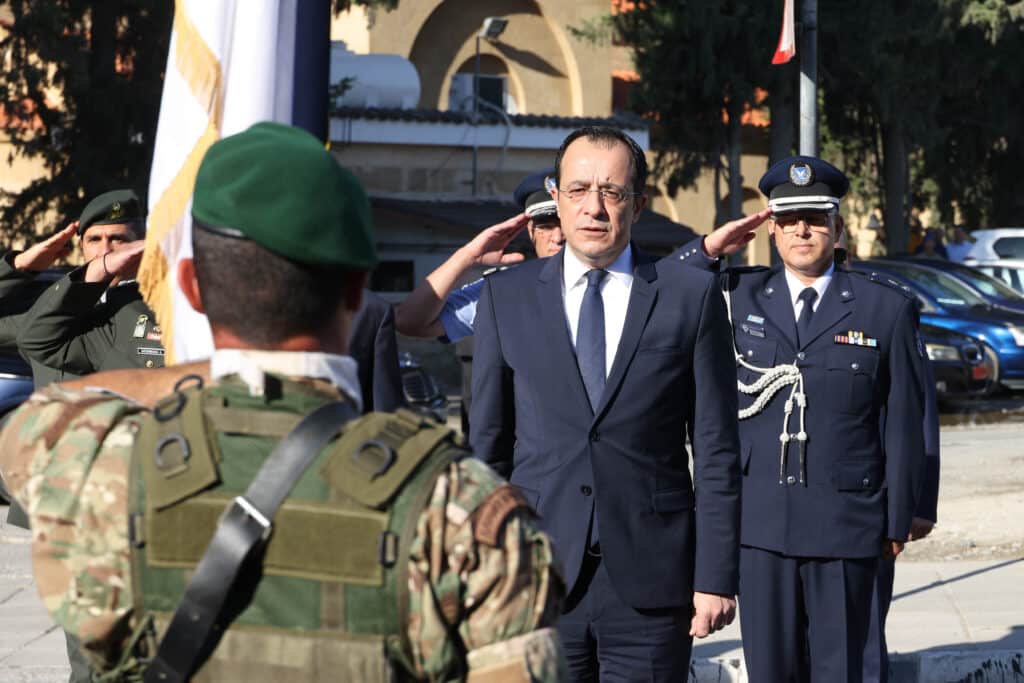The state condemns in the strongest possible terms everyone who tried to abolish democracy using armed force, giving Turkey the excuse, it was seeking to invade Cyprus, President Nikos Christodoulides told the Cyprus News Agency on the 49th anniversary of the coup d’état in Cyprus.
He added that there is an imperative need to safeguard democracy. At 8.20am on Saturday morning sirens blared across the island, as a reminder of the coup.
Christodoulides attended the annual memorial service for those who fell during the coup in defence of legitimacy and democracy, which will be held at the Holy Church of Saints Constantine and Helen at 8am.

Speaking after memorial service, the president said that the on Friday he requested from Turkish Cypriot leader Ersin Tatar to visit the committee of missing persons (CMP) anthropology lab together in the coming days, “so that we can send a positive message.”
He added that he has also informed UN Secretary-general Antonio Guterres in writing about this intention.
Commenting further, the president said that the Greek Cypriot side will continue to send positive messages, hoping that there will be reciprocation [from the Turkish Cypriot side].
Christodoulides said that accepting anything that leads to any other form of solution beyond the agreed framework of a bi-zonal, bi-communal federation is not even on the table for discussion.
On Varosha, the president said: “Surely the passage of time creates new faits accomplis, such as this.”
“We will take all the diplomatic, political steps, but the only way to prevent all these faits accompli is to solve the Cyprus problem,” he said, adding “there is no other way.”
Christodoulides said that “there is no plan B” to finding a solution and that the government will everything possible.
“Every day through our actions we try to create those conditions, so that the talks can resume,” he said and added that it was for this reason that Friday he addressed both the UN Secretary General and the Turkish Cypriot leader in writing, requesting a joint meeting at the CMP lab at the end of July or beginning of August.
“We also have some other thoughts that we have already processed, exactly showcasing our good will, so that the conditions for the resumption of talks are created, which is the great, national goal,” he added.
When asked if the thoughts concern Turkish Cypriots or the process of talks, the president said, “and not only” and added that the thoughts concern “our Turkish Cypriot compatriots and in general the talks and anything that can lead to the creation of conditions that will allow the resumption of meaningful talks from where they stayed in Crans Montana.”
At 12.30pm he laid a wreath at the Democracy and Resistance Monument of the Nicosia Democratic Resistance Association, in the park of the presidential palace.
Other memorial services for the fallen will also be held in other cities across Cyprus.
In earlier remarks, the president noted that as this day marks another sad anniversary of the dreadful events of July 15, 1974, of the treacherous coup d’ état and the overthrow of the legally elected President of the Republic of Cyprus, Archbishop Makarios III, “we recall the words of our national poet Dionysios Solomos that those who hate each other do not deserve freedom.”
He added: “The state honours the memory of the heroes sacrificed to defend the Republic of Cyprus during the treacherous coup d’ état of July 15, 1974, and at the same time condemns in the strongest possible terms everyone who tried to abolish democracy by armed force, giving Turkey the excuse, it was seeking to invade Cyprus.”
Christodoulides said that 49 years after the coup d’ état, the state’s non-negotiable duty to history is to preserve the memory of what happened and safeguard democracy, adding that memory “travels” in time as a historical imperative for everyone to work and walk together.
Turkish troops invaded Cyprus on July 20, 1974, five days after the legal government of the late Archbishop Makarios III was toppled by a military coup, engineered by the military junta then ruling Greece.
Repeated rounds of UN-led peace talks have so far failed to yield results. The latest round of negotiations, in July 2017 at the Swiss resort of Crans-Montana ended inconclusively.
Commenting on the coup, the Turkish Cypriot leader said that Greek Cypriots and Greeks “see the Republic of Cyprus, which was established with the equal founding partnership of the Turkish Cypriot people and the Greek Cypriot people, as a springboard for ‘Enosis’ [union with Greece]”.
He added that Greek Cypriots “massacred the Turkish Cypriot people with the attacks they launched on December 21, 1963, in line with the Akritas Plan, while also destroying the Republic of Cyprus by armed force and turning it into a Greek Cypriot state”.
Turning his attention specifically to the coup d’état, he said it “shows that the real occupier of Cyprus is Greece”. He added that the main goal of the proclamation of the “Hellenic Republic of Cyprus” by Nikos Sampson was to eradicate the Turkish Cypriot people and annex Cyprus to Greece.
“In the face of this great danger, the motherland Turkey used its rights and powers arising from international agreements and saved the Turkish Cypriot people from a massacre and liberated them with the Peace Operation carried out on July 20, 1974”.
 He added that this “brought peace and tranquillity to all of Cyprus”.
He added that this “brought peace and tranquillity to all of Cyprus”.
He also said thousands of Greek Cypriots who opposed the coup d’état had their lives saved by Turkey’s arrival on the island on July 20, and that democracy was brought to the island on that day.
While he acknowledged that Greek Cypriots and Greeks see Turkey’s presence in Cyprus as an “occupation”, he advised them to “look at the coups and invasion attempts which took place in Cyprus on December 21, 1963, and July 15, 1974, with the support of Greece and see who the real invader is”.
He concluded his message by referencing Archbishop Makarios’s speech at the UN on July 19, 1974, in which he said Greece had invaded Cyprus.

